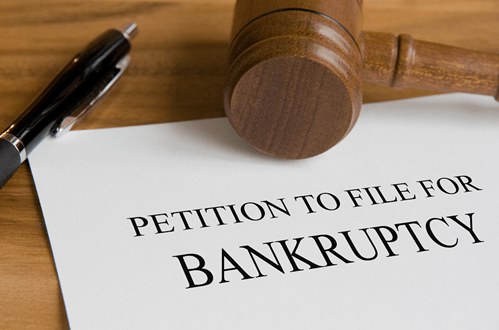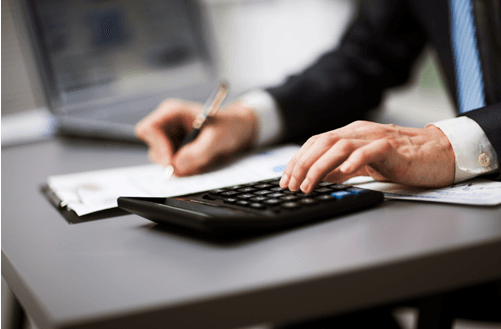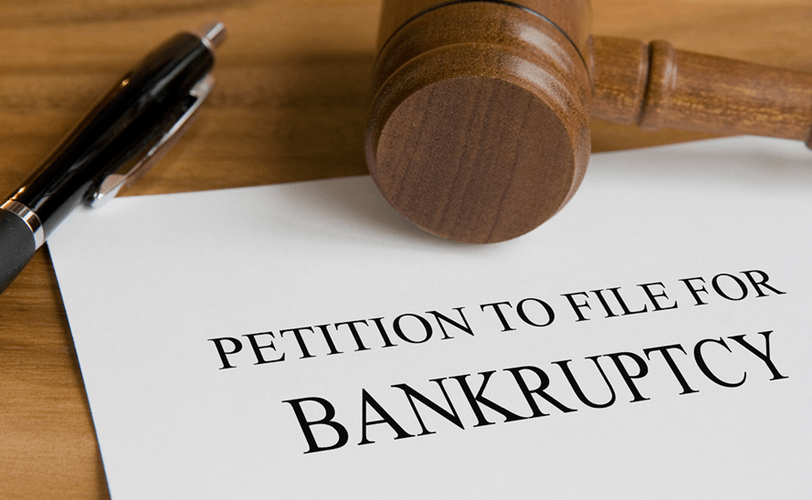Intro: What Happens When you File for Bankruptcy?
Deciding to file for bankruptcy is a big decision and not something to be taken lightly. While most negative items are removed from a consumer’s credit report after seven years, a bankruptcy will stay on your credit report for a total of ten years.
Ten years is a long time, and if you are considering filing bankruptcy you are probably worried about what happens when you file bankruptcy and how it will impact your credit and your ability to purchase a house or finance a car in the future.
In this article we will review what happens when you file for bankruptcy and what bankruptcy does to your credit.
What Does Bankruptcy Do?
Most people who find themselves in dire financial straits and are considering bankruptcy never expected to find themselves in that position, so they aren’t entirely sure what happens when you declare bankruptcy.



What Happens When you File for Bankruptcy?
Bankruptcy can be used as a tool to eliminate most debt. But what happens if you file bankruptcy partly depends on which type of bankruptcy you file for.
See Also: How Much Does a Financial Advisor Cost?
Chapter 7 Bankruptcy
Filing for Chapter 7 bankruptcy will eliminate most, if not all, of your debts. In this form of bankruptcy, all unsecured debt, such as credit card debt, is eliminated.
Secured debt, such as that associated with a house or car, where the payments are in default will most likely have the collateral repossessed by the lien holder and liquidated.
However, if you are current on your house payment, you may be able to continue making payments as normal and keep the property if there is not enough equity in it to warrant liquidating it to pay off creditors.
In the case of Chapter 7, what happens when you declare bankruptcy is that all of your debts are wiped clean, and you are given the opportunity to start over completely.
Chapter 13 Bankruptcy
Chapter 13 bankruptcy is sometimes called reorganization bankruptcy because instead of discharging all of your debts, this form of bankruptcy reorganizes them and sets up a plan for them to be repaid over a period of three to five years.
The advantage of filing Chapter 13 bankruptcy is that this form of bankruptcy allows you to keep your property, such as your house. However, not everyone qualifies for Chapter 13; you must meet certain income and debt guidelines to qualify.
In the case of Chapter 13, what happens if you file for bankruptcy is that the court will reorganize your debts in order of importance and set you up on a plan to have them repaid in a few years’ time. You will be able to keep your property with a Chapter 13 filing.
What Bankruptcy Won’t Do
When pondering what happens if you file bankruptcy, you may be under the wrong impression that it will relieve you of court-ordered or federal debt.
While bankruptcy can alleviate or eliminate most unsecured and secured debt altogether, there are certain types of debt that cannot be discharged through bankruptcy. These types of debt include child support and alimony payments, tax debts, and student loans.
Don’t Miss: Tips for Starting Your Own Business with No Money
All-in-One Change Management Tools
Top Rated Toolkit for Change Managers.
Get Your Change Management Tool Today...
What Does Bankruptcy Do To Your Credit?
When considering what happens if you file for bankruptcy, one of your biggest concerns is likely about what filing for bankruptcy will do to your credit. This is a genuine concern; however, by the time that most people get to the brink of bankruptcy their credit has most likely already taken some massive hits.
The truth is that working to salvage your financial situation by working with debt relief agencies or credit repair companies will also cause long lasting damage to your credit.
Defaults and late payments stay on your credit for seven years, and they are very hard to get rid of. Also, often times when you make a payment or payoff a debt, it is reported as recent and the seven year cycle starts all over again. This is something to keep in mind when weighing the pros and cons of what happens when you file for bankruptcy.
Bankruptcy can alleviate financial strain and put the filer on the road to credit recovery. While it is true that filing for bankruptcy will affect your ability to make big purchases such as a house or car, this is only temporary, and it is possible to bounce back from bankruptcy within a couple of years. In addition, those is dire financial situations are probably not financially ready to make a large purchase such as a home for several years to come anyway.
Get Relief from Harassing Creditors
Another thing to know about what happens when you file for bankruptcy is that the constant bombardment of calls and letters from creditors will stop almost immediately. When you file for bankruptcy, a stay is issued barring creditors from contacting you about payment. This can offer some much needed emotional relief from the stress of being constantly harassed by forceful collection agencies.
Related: Is Gold a Good Investment Right Now?
How to Recover From Bankruptcy
When considering what happens when you file for bankruptcy, it is important to know that, should you decide to file, there are steps you can take to quickly recover and begin rebuilding your credit.
Review your credit report and make sure that all discharged debt has been removed. What happens when you declare bankruptcy is that your credit report is wiped clean except for those debts that cannot be discharged, such as student loans. The first step to recovering from bankruptcy is to obtain a copy of your credit reports and dispute any debt that was discharged in the bankruptcy but remains on the report as being open and in default. All accounts discharged in the bankruptcy should be shown as closed and will usually have a statement indicating that the balance was discharged in bankruptcy.
Be cautious with credit going forward. Another thing that happens when you file bankruptcy is receiving new onslaught of offers of credit in the mail. Most of these will be for high interest credit cards with large annual fee requirements. Be cautious and take the time to carefully review the terms associated with each offer before deciding to accept any of them. While it is true that you need to have credit in order to build credit, a secured credit card can offer a better alternative to high interest and predatory offers.



Use credit sparingly. Just because five different credit card companies have sent you offers doesn’t mean you should open five credit card accounts. Limit yourself to one credit card account and use it sparingly, only a small purchase each month that you pay off in full by the due date. What happens if you file bankruptcy is that you are given a chance to start over, so use the chance wisely.
Make all of your payments on time. It is very important moving forward from bankruptcy that all payments be made before the due date each month. Consistently making on-time payments for a good length of time will help your score rise quickly after bankruptcy. Keep in mind that what happens when you file bankruptcy is that your prior late payments are wiped away — so focus very hard on keeping your payment history clean going forward.



What Does Bankruptcy do to Your Credit?
Keep credit balances low. The amount of available credit that you use is an important factor in the formula for determining credit scores. A good rule of thumb is to keep balances on credit accounts to less than fifty percent of the credit limit.
Avoid closing accounts. What happens when you file for bankruptcy is that many of your longtime accounts that went into default are closed by the creditor. This means you have to start your length of time that you have had credit all over again.
Once you get a credit card paid off, or you decide you don’t need or want that card any more, try to avoid closing the account altogether. The length of time that accounts have been open plays a factor in calculating your credit score, so feel free to cut that card up to remove temptation — but keep the account open. As time goes on, it will help you in the long run.
Let a good amount of time go by between opening new accounts. How frequently you open credit accounts plays a role in determining your credit score. Once you open a new line of credit, it is best to let some time pass before considering opening another credit account.
Try to have a mix of credit. There are two types of credit that can help you rebuild your credit score after bankruptcy: revolving credit and installment loans. Revolving credit is a credit line that is available for the consumer to use as long as they pay a minimum fee each month. This form of credit is generally offered in the form of a credit card. An installment loan is a loan made to the consumer that is repaid in equal monthly installments over a set time period, such as a car loan.
To mitigate what happens when you declare bankruptcy and rebuild your credit fast after bankruptcy, you should ideally have a mix of both of these types of credit. To avoid getting in over your head again, it is a good idea to limit yourself to one of each of these types of credit accounts.
Popular Article: Overview of Professional Liability Insurance Companies









Moving Forward After Bankruptcy
Thinking about what happens when you file bankruptcy can be scary, but it is possible to recover rather quickly. The good news is that when it comes to reviewing your credit history, recent history is given more weight than past history. This means that your timely payments and responsible credit practices after the bankruptcy are going to matter more and more as time goes on and the bankruptcy fades into the past.
While bankruptcy can have a devastating effect on your credit score immediately after you receive your discharge, it is a short-term effect. The best strategy for moving forward from bankruptcy is to leave the bankruptcy in the past and put all of your focus on the future. Focus your energy on rebuilding your credit and showing creditors that you have recovered from the bankruptcy and are trustworthy.
This will pay off rather quickly, and within a couple of years the bankruptcy will be given less weight than your recent good payment history. What happens when you declare bankruptcy most likely won’t be much worse than the damage that your credit has already taken.
Obtaining a Mortgage After Bankruptcy
Home ownership is high on many people’s priority list. One of your biggest concerns when considering what happens when you file for bankruptcy may be losing the ability to purchase a home in the near future. While it is true that bankruptcy will stay on your credit report for ten years, it will not prohibit you from making big purchases for anywhere near that long.
It is possible to qualify for a mortgage as soon as two years after a bankruptcy has been discharged. It is important that you have an impeccable credit history in the two years between the bankruptcy discharge and the two-year waiting period to apply for a mortgage. Stay diligent about making all of your payments on time and using credit wisely, and you will most likely meet the minimum credit score requirements to qualify for a mortgage once two years have passed.
When pondering your future goals and what happens if you file bankruptcy, keep in mind that having a large down payment can often help you navigate through any barriers that may be presented by having a bankruptcy, so spend the couple of years after bankruptcy saving as much as you can for a down payment.
Read More: Tips to Budget and Manage Your Money Better
Free Wealth & Finance Software - Get Yours Now ►
In Conclusion
The decision whether or not to file for bankruptcy is a very personal one. In addition to the financial worries, filing for bankruptcy can take an emotional toll as well.
When weighing the pros and cons of what happens when you file bankruptcy, keep in mind that the derogatory financial effects of bankruptcy are short-lived and you can begin rebuilding your credit history rather quickly.
When asking yourself the question of what does bankruptcy do to your credit, keep in mind that if you are on the brink of bankruptcy, your credit has probably already sustained major damage. If your credit report is already filled with late payments and defaulted loans, then bankruptcy may offer the opportunity for you to rebuild your credit much faster than trying to muddy through clearing up the debts on your own.
When considering filing bankruptcy, you should seek the advice of a bankruptcy attorney. They usually offer free bankruptcy consultations and can answer any questions you may have.
Image Sources:
- https://www.bigstockphoto.com/image-29718326/stock-photo-bankruptcy
- https://www.bigstockphoto.com/image-82252211/stock-photo-man-doing-his-accounting-financial-adviser-working
AdvisoryHQ (AHQ) Disclaimer:
Reasonable efforts have been made by AdvisoryHQ to present accurate information, however all info is presented without warranty. Review AdvisoryHQ’s Terms for details. Also review each firm’s site for the most updated data, rates and info.
Note: Firms and products, including the one(s) reviewed above, may be AdvisoryHQ's affiliates. Click to view AdvisoryHQ's advertiser disclosures.





